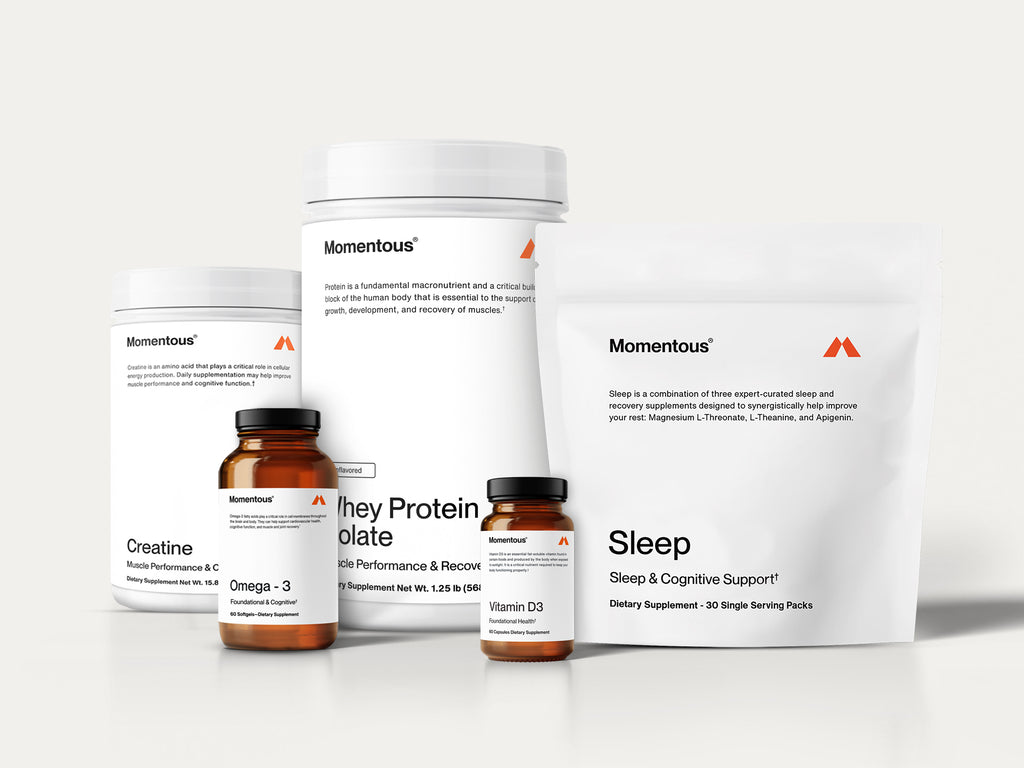These days, just about anything can happen between the time you get up and when you lay your head on the pillow. But no matter what surprises lay in store, you can set yourself up for success by supporting your body’s natural circadian rhythm in the morning and evening. In this post, we’ll take a look at how your body regulates wakefulness and sleep, what happens when your cycle gets thrown off, and how you can better bookend your day for both peak performance and optimal recovery.
What Determines Your Circadian Rhythm?
While your sleep-wake cycle is as individualized as your caloric needs and response to certain kinds of training, it’s by no means accidental. Your genetics might predispose you to being a morning lark, night owl, or what author Daniel Pink calls a “third bird” in his book When, but your environment and habits also play big parts in determining when you’re revving up and winding down.
Your body moves along a continuum between alertness and drowsiness based on the signals your brain provides through the release of neurotransmitters and hormones. The interplay between stimulating brain chemicals like cortisol that prompt wakefulness and those that trigger sleepiness like melatonin is somewhat similar to the see-saw between leptin and ghrelin that regulates whether and when you feel hungry or full. The normal pattern is for the release of cortisol and other so-called stress hormones to be highest during daylight hours and diminish as the afternoon progresses into evening, and for melatonin and other rest-promoting chemicals to be released in increasing quantities as sunlight wanes and darkness falls.
How Can Your Sleep-Wake Cycle Get Disrupted?
However, there are multiple ways that this natural ebb and flow can get disrupted. Your main body clock is governed by the Suprachiasmatic Nucleus (SCN), a collection of cells in the brain’s hypothalamus. The SCN is responsible for triggering the secretion of cortisol, dopamine, acetylcholine, and other neurotransmitters that get you up and moving in the morning and then counterbalancing these with melatonin, adenosine, and other chemicals that set you up for rest and sleep at night.
While the SCN is a powerful regulatory mechanism, it’s also a sensitive one whose output can be affected by multiple inputs. Chronobiologists – the scientists who study how your physiology intersects with timing – have found that in addition to this master clock, there are hundreds of smaller clocks in your body that are impacted by what you eat and when, the intake of foods and beverages that have either stimulating or sedative effects, physical activity, light and dark, heat and cold, and more.
Before Edison’s lightbulbs became a fixture in every household in the late 1800s, people’s schedules were largely governed by when the sun rose and set. Sure, there were oil lamps and other kinds of lighting before this, but it wasn’t until the mass adoption of electrical light in homes, businesses, and streets that society’s sleep-wake cycles began to change. Suddenly, factory workers could toil in shifts around the clock, public transport could run safely 24/7, and people could summon light in their homes with nothing more than the flick of a switch.
More recently, the proliferation of technology – first personal computers and then mobile devices like tablets and phones – has increased the frequency, duration, and lateness that we’re exposed to stimulating blue light. Bright light signals are processed by receptors in your eyes and interpreted by various parts of your brain. One of these is the SCN, which responds by continuing to release cortisol and other stimulating chemicals long after it naturally would, while delaying the secretion of melatonin and other rest-promoting neurotransmitters.
Add in late consumption of caffeine, the mixed signals sent by alcohol (which can make you feel drowsy but, as sleep researchers like Matthew Walker have shared, actually diminishes sleep quality), and irregular physical movement, and it’s no wonder that millions of people are struggling to fall asleep at night and wake up feeling refreshed in the morning.
How Can You Reset Your System?
If you often feel tired and wired in the evening or can’t seem to get going in the morning, don’t despair. Just as your lifestyle and behavior can get your sleep-wake cycle out of whack, so too can you alter them to get back on track. As Momentous Performance Engineer and Texas Tech head strength and conditioning coach Dave Sholtz told us recently, “The biggest thing people can do to restore a normal sleep-wake curve is to improve their habits at both ends of the day.”
To restore natural balance to your circadian rhythm, start by fine-tuning your morning habits. Getting some morning sunshine signals to your SCN that it needs to release more cortisol and other hormones to get you going. Combine this with exercise to double-down on the stimulating effects of sunlight. Sholtz also advises his athletes to eat a breakfast that’s high in both protein and fat, as research has shown that this increases the release of dopamine and acetylcholine, which are associated with focus, alertness, and wakefulness.
Taking a nootropic supplement daily can further amplify neurotransmitter release and support nervous system function. A study published in Phytotherapy Researchconcluded that the Bmonnieri in Momentous Brain Drive helped participants multitask with less stress, and researchers from Harvard Medical School and McLean Hospital found the citicoline in our unique formula increased brain energy by 14 percent.[1] Vitamin B6, one of the four B vitamins included, has been shown to increase the release of dopamine, serotonin, and other brain chemicals.[2]
If you’re trying to overcome circadian rhythm disturbances, it’s imperative that you also take aim at fixing your evening routine. To start, make sure you have your last caffeinated drink at least six hours before bed, and more like eight if you’re sensitive to it. On the other end of the stimulant-sedative scale, if you’re going to consume alcohol, stick to one glass of wine or bottle of beer with dinner, as the food will help level out its absorption. Then try to cut out screen time at least two hours before turning in as the blue light from your devices, impulse to reply to emails, and dopamine hit you’ll get from your likes and retweets on social media could increase the amount of time it takes you to fall asleep.
At night, your SCN should send a signal that causes your body temperature to drop, but this can be blunted if you’ve been overstimulated by light, caffeine, or other factors. In which case, sleeping in a cool environment (the sweet spot seems to be 63 to 68 degrees) can assist in the process. Your bedroom should also be dark so you don’t send mixed signals to your SCN, and tech-free to help you avoid the temptations of checking for updates when you’re meant to be drifting off. If you’re still struggling to fall asleep or often wake up multiple times each night, a supplement like Momentous Elite Sleep can help. You can learn more about Momentous Elite Sleep.
[1] S Benson et al, “An Acute, Double-Blind, Placebo-Controlled Cross-Over Study of 320 mg and 640 mg Doses of Bacopa Monnieri (CDRI 08) on Multitasking Stress Reactivity and Mood,” Phytotherapy Research, April 2014, available online at https://pubmed.ncbi.nlm.nih.gov/23788517/; M M Silveri et al, “Citicoline Enhances Frontal Lobe Bioenergetics as Measured by Phosphorus Magnetic Resonance Spectroscopy,” NMR in Biomedicine, November 2008, available online at https://pubmed.ncbi.nlm.nih.gov/18816480/.
[2] David O. Kennedy, “B Vitamins and the Brain: Mechanisms, Dose and Efficacy—A Review,” Nutrients, February 2016, available online at https://www.ncbi.nlm.nih.gov/pmc/articles/PMC4772032/.
[3] Atul Khullar, “The Role of Melatonin in the Circadian Rhythm Sleep-Wake Cycle,” Psychiatric Times, July 9, 2012, available online at https://www.psychiatrictimes.com/view/role-melatonin-circadian-rhythm-sleep-wake-cycle; J Chen et al, “A Review of Dietary Ziziphus Jujuba Fruit (Jujube): Developing Health Food Supplements for Brain Protection,” Evidence-Based Complementary and Alternative Medicine, 2017, available online at https://www.ncbi.nlm.nih.gov/pmc/articles/PMC5478819/; J Wang, et al. “Magnesium L-threonate Prevents and Restores Memory Deficits Associated with Neuropathic Pain by Inhibition of TNF-α.” Pain Physician, September 2013, available online at https://pubmed.ncbi.nlm.nih.gov/24077207/.















